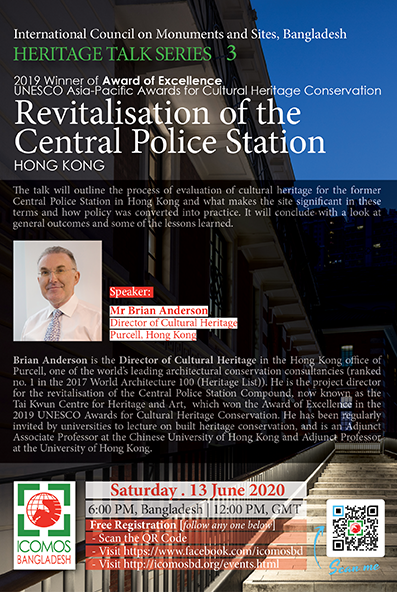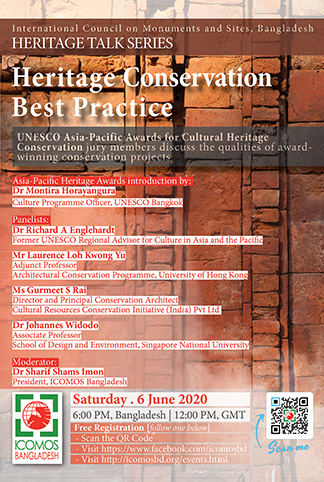Upcoming Event

UNESCO-ICOMOS Bangladesh Heritage Impact Assessment Workshop
Dates
10:00-16:30 Friday*, 26 November
10:00-16:30 Saturday, 27 November
10:00-13:00 Saturday, 4 December
10:00-13:00 Saturday, 11 December
10:00-16:30 Friday*, 17 December
10:00-16:30 Saturday, 18 December
*[Prayer and lunch break 12:30-14:30 , for Fridays online]
Application deadline
Sunday, 21 November 2021
Location
Online
Workshop cost
Free
The Workshop
“A heritage impact assessment is undertaken to determine the potential impacts of a proposed development or site alteration on a heritage resource and recommended mitigation and conservation measures.” - Heritage BC, Canada
The workshop will equip the participants with the current knowledge and skills to carry out impact assessments and use them as a decision-making tool in heritage management practices.
Certificate
Certificate of Attendance will be issued to participants who attend at least 90 per cent of all workshop sessions (minimum 9 out of 10 sessions) and submit an assignment.
Trainers
A team of local and international heritage management experts will deliver the workshop.
Working Language
Bangla
[Simultaneous Bangla interpretation will be available for presentations in English. Please do not apply if you cannot communicate in Bangla]
Eligibility
Bangladeshi citizen
Minimum a bachelor’s degree in a cultural heritage related field (anthropology, archaeology, architecture, conservation, urban planning, etc.)
Priority will be given to:
Early or mid-career heritage practitioners
Academics teaching cultural heritage related courses
Maximum number of participants
20
Application

- 2-page CV [Your application is not complete without your CV. Please send your CV to the email address below]
Contact: Email: event@icomosbd.org
[use the subject “HIA 2021”]
Be the first to get our event news
We update our Facbook page frequently and our event news are posted there first. To receive ICOMOS Bangladesh event news and our partners' event news regularly, "Like" our Facebook page.
Recent Event
Heritage Talk Series 3
Revitalisation of the Central Police Station, Hong Kong
Date: Saturday, 13 June 2020
Time: 6.00 PM (BDT) | 12:00 PM (GMT)
Zoom Webinar + Facebook Live
After registering, you will receive a confirmation email containing information about joining the event.
Heritage Talk Series 2
Heritage Conservation Best Practice
Date: Saturday, 6 June 2020
Time: 6.00 PM (BDT) | 12:00 PM (GMT)
Online
Working Paper Series
Date: Wednesday, 20 May 2020
Time: 3.30 pm (BDT)
Venue: Online
Abstract
Historic Edifices of Ramna: An Embedded Heritage Route in Urban Dhaka
Farzana Mir and Fahmida Nusrat
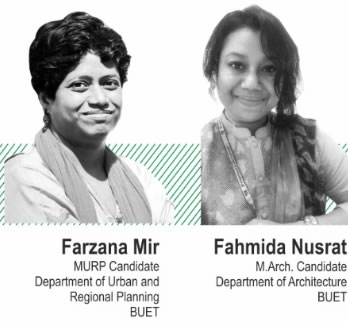
For a city that started on the bank of a river, Dhaka shows a unique characteristic in its urban development pattern. The 400-year old city in its historical timeline shifted from the river towards the land, giving preference to a certain area that is known as Ramna. The history of Ramna began in 1608 with the Mughal. It comprised two residential areas of the high officials of the Mughals. It once placed Mughal garden, green open spaces, and garden houses. The British cleared the jungle of Ramna and built a racecourse and boulevard for the elites to stroll in the evening. The planning of this area as the civil station of the newly formed province of East Bengal and Assam in 1905 saw the construction of several edifices. It also witnessed the building of the first modern architecture by Architect Mazharul Islam of Bangladesh. A walk started from the Musa Khan Mosque tucked in between Curzon Hall and Shahidullah Hall towards the Institute of Fine Arts of Dhaka University would take us from Mughal to Modern Dhaka. The collections of buildings of Ramna from different historical phases tell the story of the past in a synchronized manner. The study reveals a diverse historic route of a different timeline within the contemporary urban form of Dhaka. Hence objective of this paper is to explore how the embedded connectivity of a historic urban segment can be traced down with the help of space syntax analysis to define a unique heritage route for future planning of the city.
Abstract
Locating the Lost Waterbodies in Dhaka
Dhrubo Alam
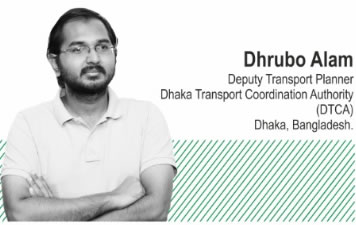
Dhaka, a present-day megacity and the capital of Bangladesh, started as a settlement on the bank of Buriganga river (probably from the river port presently known as Sadarghat, and nearby Banglabazar) and expanded along the natural levee created by the river. It sits almost on the confluence of the tributaries of two large river basins, namely Meghna and Brahmaputra. It (greater Dhaka) had and still has (Buriganga, Shitalakkhya, Turag and Balu) rivers though in a miserable condition around its periphery. Also, the city used to have two large canals, which sometimes have been termed as rivers (i.e. Dolai and Pandu river/canal). Moreover, the city also had swamps or marshes covering a substantial area. As a result, the Mughal rulers in between 17th and 18th century built flood protection structure (bund) to save the city from frequent flooding and also dug up and extended Dolai Canal. They also constructed metalled roads for better movement, which reduced the significance of waterways as a mode of travel. In the British period, the city corporation, which was established in 1864, started to build and maintain roads extensively, managed drainage and sewerage systems. All these resulted in less and less importance of the presence of the waterbodies in Dhaka. Also, with the rapid increase in population and urbanization, the demand for land started to rise, and the prices went up. So, not only the private owners but also the governmental organizations of the swamp or marshlands filled up their waterbodies for different purposes. Some of the water bodies became dump yards, and canals became drains to carry sewer (and rainwater), a trend which was initiated by the British and continues today. This presentation tries to locate three of those lost water bodies (e.g. Pandu River, Dolai Canal and Miran Jalla) of Dhaka, explore the reasons they have been lost and their present situation.
Heritage Lecture Series
Towards Climate Action for Building Resilience of Urban Heritage in South Asia
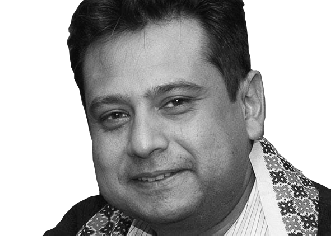
Dr Rohit Jigyasu
Project Manager
Urban Heritage, Climate Change & Disaster Risk Management Programme Unit
International Centre for the Study of the Preservation and Restoration of Cultural Property (ICCROM), Rome, Italy
Date: Thursday, 16 April 2020 Time: 4.30 pm
Venue: Online
Abstract
Statistics point to the fact that in recent decades, most disaster events were hydrological, meteorological or climatological in nature and have adversely affected cultural heritage of cities. Recent projections from the UN point that global warming could rise up to 3.2 degrees Celsius by 2100, which is higher than the limit of 2 degrees Celsius set by the Paris Agreement. Historic Cities globally and especially in South Asia are witnessing increasing pressure of urbanization that exacerbates their vulnerability to climate risks as demonstrated by increased instances of urban flooding, heat islands and epidemics. Since people, properties, infrastructure, and capital stock are concentrated in cities, the impact of climate change-related hazards in urban areas can be catastrophic and economic costs of their recovery can run into billions of dollars. The lecture will highlight the impact of climate change on urban heritage with a special focus on South Asia. It will also illustrate how urban heritage can contribute towards building resilience through traditional knowledge systems accumulated over generations of human experience in dealing with changing environmental conditions. Various polices, strategies and planning measures necessary for mitigating and adapting to the risks of climate change will be explained through examples along with transformative change needed for creating enabling conditions for implementation. The presentation will conclude by highlighting various international initiatives undertaken by organizations such as ICCROM and ICOMOS to build climate resilience of historic cities and urban areas.
INTERNATIONAL SEMINAR-WORKSHOP ON CLIMATE CHANGE AGENDA FOR CULTURAL HERITAGE IN BANGLADESH
09:00-17:00 .
SATURDAY, 9 FEBRUARY 2019
KHULNA UNIVERSITY, KHULNA, BANGLADESH
BUET-ICOMOS Workshop on Disaster Risk Management of Cultural Heritage
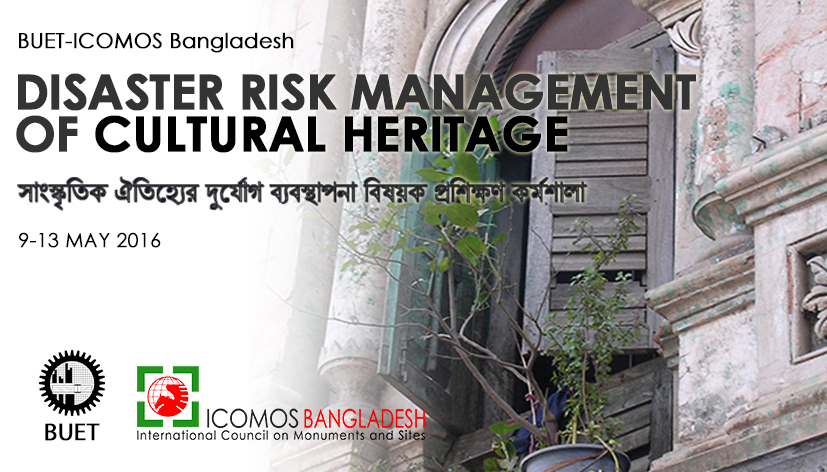
9-13 May 2016
Our upcoming training workshop on Disaster Risk Management of Cultural Heritage will take place from 9 to 13 May at the Bangladesh University of Engineering and Technology (BUET). It is a joint BUET-ICOMOS initiative in which ICOMOS Bangladesh is proud to have the Department of Architecture (BUET) as the partner. An international ICOMOS expert in this field, along with local experts, will lead the 4.5-day training workshop. To know more about ICOMOS' activities related to this important area of heritage management, please read on. Workshop page »
Past Events
The World Day for Cultural Diversity for Dialogue and Development- 2015
Jointly organized by ICOMOS Bangladesh and UNESCO Dhaka
First Round Table Discussion on the Preservation of the Built Heritage of Old Dhaka, Bangladesh
10:00 am – 12:30 pm, 21 May 2015
Southeast University, Bangladesh
Since 2001, UNESCO has been celebrating 21 May as The World Day for Cultural Diversity for Dialogue and Development. The day aims to highlight the UNESCO’s Convention on the Protection and Promotion of the Diversity of Cultural Expressions 2005 that provides a framework to form new pathways to encourage cultural diversity, creativity and innovation in the pursuit of inclusive, equitable and sustainable growth and development. The World Day for Cultural Diversity for Dialogue and Development gives us the opportunity to deepen our understanding of the values of cultural diversity ranging from cultural heritage to creative industries, sustainable tourism to cultural infrastructure as driver and enabler of sustainable development. This year, on 21 May, ICOMOS Bangladesh and UNESCO Dhaka jointly organized the First Round Table Discussion on the Preservation of the Built Heritage of Old Dhaka, Bangladesh to share ideas and exchange views among scholars, academia, researchers and professionals working in relevant fields.
The discussion, which was inaugurated by Ms. Beatrice Kaldun, Head and Representative of UNESCO Dhaka and moderated by Mr. Sazzad Hossain, General Secretary of ICOMOS Bangladesh, brought together a group of stakeholders to engage in joint actions and to make clear suggestions on how to best manage the dynamic forces that is causing rapid urban transformation, and maintain the essential physical fabric of historic areas of Dhaka while ensuring their social and economic viability as well as long term sustainability. Within the broader urban management framework, the discussion focused on the following key issues:
- Existing condition & legal standards of the historic area.
- Prospects and challenges of conserving Old Dhaka heritage.
- How to ensure inclusive management for Old Dhaka
- Adaptive use & conservation as a tool for economic development of Old Dhaka
- Need for a comprehensive plan for urban conservation.
The discussions identified several key obstacles to achieving these goals and lead to the conclusion that an integrated approach is necessary for a meaningful preservation and revitalization of the historic areas and concluded with the following recommendations:
- A comprehensive plan for urban conservation is required urgently to save the Old Dhaka heritage.
- Adaptive use of historic buildings maybe used as a tool for economic development in Old Dhaka
- Amendment of “Bangladesh Protected Tourist Area and special Tourist zone- circular, 2010”, published by the Ministry of Law, Justice and Cabinet may enhance coordination between the relevant actors and stakeholders.
- Specific policy should be formulated by the Ministry of Cultural affairs to allocate research grants to projects related to cultural heritage conservation and to bridge the gap between research and action.
List of Participants
Ms. Beatrice Kaldun, Head and Representative of UNESCO Dhaka
Ms. Kizzy Tahnin ,Programme Officer, Culture, UNESCO Dhaka Office
Mr. Sazzad Hossain, General Secretary of ICOMOS Bangladesh.
Prof. Meer Mobashsher Ali, Chairman, Dept of Architecture, SEU.
Mr. Md Akhtaruzzaman,UN Habitat Programme Manager, Dhaka.
Mr. Md. Moniruzzaman,Officer In-Charge, UNIC, Dhaka
Mr. Akhtaruz Zaman Khan Kabir ,CEO ,Bangladesh Tourism Board.
Mr. ASM Aminur Rahman, Deputy Chief Architect, Department of Architecture, Ministry of Housing and Public Works
Ms. Afroza Khan Mita , Deputy Director, DOA.
Ms. Munira Sultana, Deputy Secretary, Ministry of Cultural Affairs.
Ms. Rakhi Roy , Regional Director, DOA
Mr. Sirajul Islam, Town planner, RAJUK.
Mr. Ziaul Hawlader, Deputy Manager (Planning) Bangladesh Parjatan Corporation.
Mr. Anisul Hoque, Joint Editor, Prothom Alo.
Mr. Azim Buksh, Chairman, Dhaka Kendra.
Mr. Anindya Pandit, lecturer, SEU
Ms. Awnili Shabnam, lecturer, SEU
Mr. Nurul Kabir , Coordinator , Centre for Archaeology and Heritage Research, Dhaka
Prof. Perveen Hassan, Vice Chancellor, Central Women’s University
Dr. Sharifuddin Ahmed, Former Professor, Department of History, Dhaka University
Dr. Shahnaj Husne Jahan, Professor and Director, Centre for Archaeological Studies, University of Liberal Arts Bangladesh
Dr. Shafiql Alam, Ex Director General, Department of Archaeology, Government of Bangladesh
Understanding Heritage Significance of Cultural Sites
The First ICOMOS-Bangladesh Workshop on Heritage Conservation and Management In partnership with Department of Architecture, Southeast University, Dhaka Supported by UNESCO Dhaka.
Wednesday, 18 February 2015
There is a growing interest – along with an increase – in the number of projects involving cultural heritage in Bangladesh. However, a lack of opportunities for professional development for people involved in heritage protection or interested in developing a career in this field means Bangladesh is lagging far behind in protecting its cultural heritage, even when compared to other countries in the South Asian region. The aim of this workshop, which is the first of a series of workshops to be organised by ICOMOS-Bangladesh in future, is to provide a framework for professional assessment of heritage significance of cultural sites. The assessment is an essential first step for a wide array of decision making process touching sites of (potential) heritage importance. Providing a statement of heritage significance is also a required component of any nomination for UNESCO World Heritage inscription.
This workshop aimed to provide its participants with a framework to carry out a professional assessment of heritage significance of cultural sites and to develop a Statement of Heritage Significance, a key component of a Conservation Plan and Management Plan for heritage sites.





